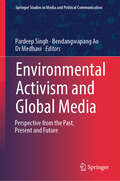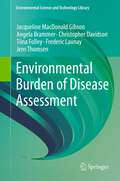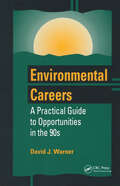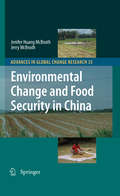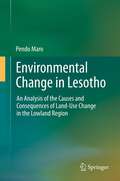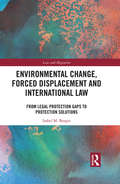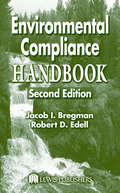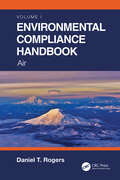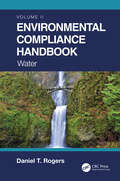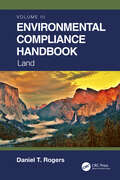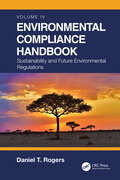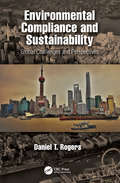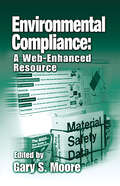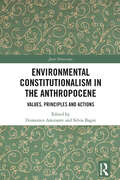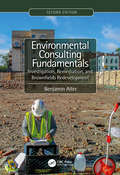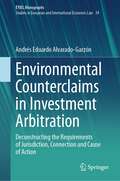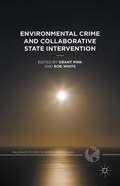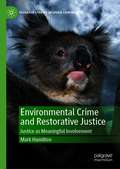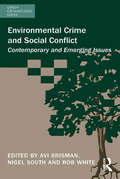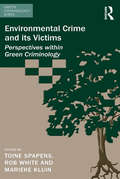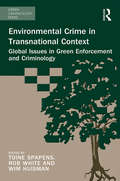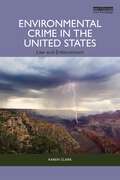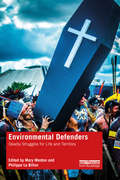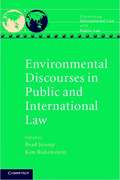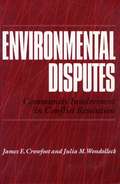- Table View
- List View
Environmental Activism and Global Media: Perspective from the Past, Present and Future (Springer Studies in Media and Political Communication)
by Pardeep Singh Bendangwapang Ao Dr MedhaviThis scholarly work discusses the historical, contemporary, and prospective dimensions of environmental activism and its intersection with global media. It provides a comprehensive view of the pivotal role played by the media in shaping awareness concerning environmental challenges and catalyzing actions to address them. Drawing upon the insights of an interdisciplinary cohort of scholars, the book systematically examines the diverse aspects of the nexus between media and environmental activism. Chapter contributions establish the foundational framework for comprehending how media as a whole lend support to activism; delineate the historical trajectory of environmental activism; the construction of narratives within the political, economic, and social domains of society; scrutinize the function of mass media within the context of globalization, digitization, and social media; and elucidate how governance structures influence the environmental activism process. By introducing readers to the basic narrative in environmental activism, globalization, and media, this book will be an important source of information for researchers, academicians and students engaged in various interdisciplinary studies linked to media, environment and activism.
Environmental Burden of Disease Assessment
by Christopher Davidson Angela Brammer Jens Thomsen Frederic Launay Tiina Folley Jacqueline Macdonald GibsonThis publication characterizes the environmental burden of disease in the United Arab Emirates (UAE), measured by the excess number of deaths and illnesses in the population due to exposure to environmental hazards. The robust methods used in this risk analysis can be applied to any country or region. This publication documents the systematic, multi-step process used to identify environmental priorities and the detailed methods used to quantify the disease burden attributable to each risk. Based on the results of the burden of disease assessment, the publication summarizes the subsequent steps that are recommended to further reduce the burden of disease resulting from various environmental risk factors. Authors and Contributors This book represents the synthesis of research carried out by a large, interdisciplinary team from several institutions and multiple nations between June 2008 and June 2011.The lead authors are responsible for weaving together the pieces prepared by the team.Nonetheless, this book would not have been possible without major contributions from each team member.The list below shows contributors to each chapter.Following this list are biographies of all of the authors and contributors. Lead Authors Jacqueline MacDonald Gibson, Frederic J. P. Launay, Jens T. W. Thomsen, Angela Brammer, Christopher Davidson Additional Contributors (by Chapter) Chapter 2: Prioritizing Environmental Risks to Health Henry H. Willis, Aimee Curtright, Gary Cecchine, Zeinab S. Farah,Sandra A. Geschwind, Jianhui Hu, Ying Li, Melinda Moore, Sarah Olmstead, Hanine Salem, Regina A. Shih, J. Jason West Chapter 3: Assessing the Environmental Burden of Disease:Method Overview Tiina Folley, Elizabeth S. Harder, Mejs Hasan Chapter 4: Burden of Disease from Outdoor Air Pollution Ying Li, Gavino Puggioni, Prahlad Jat, Mejs Hasan, Marc Serre, Kenneth G. Sexton, J. Jason West, Saravanan Arunachalam, Uma Shankar, William Vizuete, Mohammed Zuber Farooqui Chapter 5: Burden of Disease from Indoor Air Pollution Chris B. Trent Chapter 6: Burden of Disease from Occupational Exposures Tiina Folley, Leena A. Nylander-French Chapter 7: Burden of Disease from Climate Change Richard N. L. Andrews, Leslie Chinery, Elizabeth S. Harder, J. Jason West Chapter 8: Burden of Disease from Drinking Water Contamination Gregory W. Characklis, Joseph N. LoBuglio Chapter 9: Burden of Disease from Coastal Water Pollution Gregory W. Characklis, Leigh-Anne H. Krometis, Joseph N. LoBuglio Chapter 10: Burden of Disease from Soil and Groundwater Contamination Chidsanuphong Chart-asa, Stephanie Soucheray-Grell Chapter 11: Burden of Disease from Produce and Seafood Contamination Leigh-Anne H. Krometis, Leslie Chinery
Environmental Careers: A Practical Guide to Opportunities in the 90s
by David J. WarnerEnvironmental Careers presents a broad-based, yet concise survey of employment opportunities in the environmental field. The book stresses the need for students to develop a strong technical background in the sciences to be effective in understanding and solving complex environmental problems. It also emphasizes the importance of developing relevant work experience through internships or volunteer work to help find entry-level employment in the environmental field. Environmental Careers includes opportunities in natural resources management, environmental protection, environmental health and safety, environmental education, allied environmental careers, and non-degree technical careers. Important issues for students, guidance counselors, and mid-career changers, such as salaries, characteristics of employers, and the latest trends in demands for environmental professionals, are addressed. The book also presents the 10 best career prospects for the 1990s and offers guidance on developing and implementing a personal action plan for pursuing an environmental career.
Environmental Change and Food Security in China
by Jenifer Huang Mcbeath Jerry McbeathWith 22 percent of the world's population but only 7 percent of its arable land, China's food situation is a matter of global concern. This volume is the first to introduce comprehensively the threats to China's system of food production, distribution, and consumption. It analyzes broad challenges of population growth, urbanization, and extraordinarily rapid economic development. Then it focuses on degradation of China's land, water and air, water sufficiency, and evidence of climate change effects as they adversely affect the food system. The study investigates plant diseases and pests which take a large toll on agricultural production and also considers alien invasive species. Normal bureaucratic routines of agricultural, land, water, climatological, and environmental agencies are inadequate to counter these challenges, and the regime has launched large projects (e.g., the South-North Water Diversion Project) and conducted national campaigns (e.g., re- and afforestation programs) which are unprecedented in their scope. Also, China has invested more heavily in agricultural biotechnology research than any other developing country. These responses have insured self-sufficiency in food staples to the present. The volume evaluates several future problems and issues in China's approach to food security. Despite attempts to tighten coordination of policy and improve enforcement, as seen in efforts to resolve the tainted products crisis of 2007, the increased autonomy of local governments often frustrates green and clean ambitions of the state. Although the regime has tolerated environmental and other NGOs, allowed the media greater latitude to report bad news, and permitted protests that do not challenge the communist party's authority, still civil society is weak. While economic development has lifted more than 200 million from poverty, rural/urban inequality increases, pushing the poor into China's cities, and access to food remains a problem for many.
Environmental Change in Lesotho
by Pendo MaroEnvironmental Change in Lesotho identifies and analyzes the drivers of land-use change and the consequences of these changes on the livelihoods of rural land-users/managers. To accomplish this, a combination of tools from the social sciences and environmental fields were developed to identify causes and consequences of land-use change at selected levels, using a 'nested' approach. These methods were then applied to a case study of two villages in the Lowland region of Lesotho. This book is directed at environmental and social science experts, researchers, decision-makers, and development/aid workers interested in understanding the intricate human-environment relationship as it relates to land-use change in a changing biophysical, socio-economic, political and institutional context, coupled by HIV/AIDS, changing demographics, local perceptions and what is termed here 'dependency syndrome'.
Environmental Change, Forced Displacement and International Law: from legal protection gaps to protection solutions (Law and Migration)
by Isabel M. BorgesThis book explores the increasing concern over the extent to which those suffering from forced cross-border displacement as a result of environmental change are protected under international human rights law. Formally they are not entitled to admission or stay in a third state country, a situation that has been identified as an international "legal protection gap". The book seeks to provide answers to two basic questions: whether and to what extent existing international law protects cross-border environmental displacement, and whether and how existing formalized regional complementary protection standards can interpretively solidify and conceptualize protection for cross-border environmental displacement. The discussion outlines that the protection of the human person is not only an ex post facto obligation of states, but must be increasingly seen as an ex ante one. The analysis further suggests that the European Union regionally orientated protection regime can help states to consolidate an evolving protection paradigm of proactive and reactive measures being erected at the international level. It can also narrow the identified legal protection gaps. In so doing, it helps states to reconceptualise protection as a holistic and dynamic enterprise. This book will be of great interest to academics in law, political science and human rights, policy makers and civil society organisations both at national and international level.
Environmental Compliance Handbook
by Jacob I. Bregman Robert D. EdellIf your organization was subject to the thousands of federal, state, and local environmental laws and regulations in effect in the U.S. at the turn of the century, the Environmental Compliance Handbook should be within easy reach. Thousands of professionals have benefited from the bestselling classic. This practical, comprehensive book simplifies t
Environmental Compliance Handbook, Volume 1: Air
by Daniel T. RogersEnvironmental laws and regulations are extremely complex and difficult to understand. In order to comply with them, they need to be explained in layperson’s terms. This handbook identifies many changes in regulations and recommends ways to apply and implement them. Containing the latest environmental information, this volume addresses environmental compliance with air and provides a historical perspective to help follow the logical growth and increased complexity of air regulations through time. Structured as a “step-by-step how-to” book, readers will find real-life examples for the most important aspects of language, permit terms, demonstrating compliance, and organization for air projects. Features: Identifies all air pollution control regulations and the requirements of any air pollution control permits available up to date. Answers in depth all practical questions that arise when working on compliance projects in a “how to” method. Addresses a wider spectrum of issues that go beyond chemical-based contamination and environmental regulations and examines the impacts of climate change Includes many real-life examples from industry and institutions that comply with air quality regulations and air pollution control permits It is global in coverage and very useful to companies that have expanded operations outside their country of origin.
Environmental Compliance Handbook, Volume 2: Water
by Daniel T. RogersEnvironmental laws and regulations are extremely complex and difficult to understand. In order to comply with them, they need to be explained in layperson’s terms. This handbook identifies many changes in regulations and recommends ways to apply and implement them. Containing the latest environmental information, this volume addresses environmental compliance with water and provides a historical perspective to help follow the logical growth and increased complexity of water regulations through time. Structured as a “step-by-step how-to” book, readers will find real-life examples for the most important aspects of language, permit terms, demonstrating compliance, and organization for water projects. Features: Identifies all water pollution control regulations and the requirements of any water pollution control permits available up to date Answers in depth all practical questions that arise when working on compliance projects in a "how-to" method Addresses a wider spectrum of issues that go beyond chemical-based contamination and environmental regulations and examines the impacts of climate change Includes many real-life examples and case studies from industry and institutions that comply with water quality regulations It is global in coverage and very useful to companies that have expanded operations outside their country of origin
Environmental Compliance Handbook, Volume 3: Land
by Daniel T. RogersEnvironmental laws and regulations are extremely complex and difficult to understand. In order to comply with them, they need to be explained in layperson’s terms. The handbook identifies many changes in regulations and recommends ways to apply and implement them. Containing the latest environmental information, this third volume addresses environmental compliance with land and provides a historical perspective to help follow the logical growth and increased complexity of land regulations through time. Structured as a “step-by-step how-to” book, readers will find real-life examples for the most important aspects of language, permit terms, demonstrating compliance, and organization for land projects. Features: Introduces all land pollution control regulations and the requirements of any land pollution control permits available up to date Answers in depth all practical questions that arise when working on compliance projects in a "how-to" method Addresses a wider spectrum of issues that go beyond chemical-based contamination and environmental regulations and examines the impacts of climate change Includes many real-life examples and case studies from industry and institutions that comply with land use regulations It is global in coverage and very useful to companies that have expanded operations outside their country of origin
Environmental Compliance Handbook, Volume 4: Sustainability and Future Environmental Regulations
by Daniel T. RogersEnvironmental laws and regulations are extremely complex and difficult to understand. In order to comply with them, they need to be explained in layperson’s terms. This handbook identifies many changes in regulations and recommends ways to apply and implement them. Containing the latest environmental information, this volume goes beyond environmental regulations in two fundamental aspects: sustainability and preparation for future requirements before mandates are enacted. Structured as a “step-by-step how-to” book, readers will find real-life examples for the most important aspects of evaluating sustainability initiatives and preparing for new and revised environmental regulations. Features: Explores all sustainability related concepts and regulations and the requirement of any control permits available up to date. Answers in depth all practical questions that arise when working on compliance projects for future requirements. Addresses a wider spectrum of sustainability issues that go beyond chemical-based contamination and environmental regulations and examines the impacts of climate change. Includes many real-life examples and case studies from industry and institutions that comply with sustainability regulations. It is global in coverage and very useful to companies that plan to expand operations outside their country and are interested in future regulations.
Environmental Compliance and Sustainability: Global Challenges and Perspectives
by Daniel T. RogersThis book provides a critical understanding of the challenges that exist in protecting the local and global environment through compliance efforts using existing environmental regulations. The best compliance measures with the most useful regulations from over 50 countries are surveyed and are combined with science-based quantitative analysis of geology, hydrogeology, and the chemistry of contaminants from anthropogenic sources. The results are presented as a model that establishes a means by which protection of the environment can be greatly improved. This is accomplished through a deeper understanding of our natural world and how anthropogenic activities and their management affect our planet. Features The first book that examines the successes of environmental regulation worldwide and highlights the areas that need improvement Presents a tested and verified scientific model for enhanced environmental protection with scalability from local parcels to global levels Describes and integrates the importance of understanding the geologic and hydrogeologic environment of urban and developed areas Explains the importance of understanding the different types of pollution and their behavior in the environment Identifies the need for consistency in banning chemicals that are harmful in not just one country but throughout the world
Environmental Compliance: A Web-Enhanced Resource
by Gary S. MooreSTAY INFORMED-STAY COMPLIANT-STAY UP-TO-DATEYou can't do business in the United States without complying with a whole new generation of environmental regulations. Get all the information you need with Environmental Compliance: A Web-Enhanced Resource. This resource will never be outdated. With the continually updated Web site, you will alwa
Environmental Constitutionalism in the Anthropocene: Values, Principles and Actions (Juris Diversitas)
by Domenico Amirante Silvia BagniThis book examines the relationship between man and nature through different cultural approaches to encourage new environmental legislation as a means of fostering acceptance at a local level. In 2019, the International Union of Geological Sciences (IUGS) recognised that we have entered a new era, the Anthropocene, specifically characterised by the impact of one species, mankind, on environmental change. The Anthropocene is penetrating the discourse of both hard sciences and humanities and social sciences, by posing new epistemological as well as practical challenges to many disciplines. Legal sciences have so far been at the margins of this intellectual renewal, with few contributions on the central role that the notion of Anthropocene could play in forging a more effective and just environmental law. By applying a multidisciplinary approach and adopting a Law as Culture paradigm to the study of law, this book explores new paths of investigation and possible solutions to be applied. New perspectives for the constitutional framing of environmental policies, rights, and alternative methods for bottom-up participatory law-making and conflict resolution are investigated, showing that environmental justice is not just an option, but an objective within reach. The book will be essential reading for students, academics, and policymakers in the areas of law, environmental studies and anthropology.
Environmental Consulting Fundamentals: Investigation, Remediation, and Brownfields Redevelopment, Second Edition
by Benjamin AlterThis book is a primer for those interested in a career in this dynamic, multidisciplinary field as well as a handy reference for practicing consultants. Combining theory and practice advice into a concise, readable format, the book is an accessible introduction to the types of projects you will encounter as an environmental consultant and lays the groundwork for what you’ll need to know in this challenging and rewarding profession. Also available with this book, under the Additional Resources tab, are PowerPoint lectures that correspond with each chapter. New in the Second Edition Covers the latest environmental issues, including emerging contaminants, and the latest technological advances in environmental investigation and remediation New chapters dedicated to vapor intrusion investigation and mitigation and to Brownfields redevelopment and project financing. An expanded chapter describing the staffing, budgeting, and execution of environmental projects. Descriptions of the remediation processes under RCRA and Superfund Descriptions on how each chapter’s subject matter applies to the job of the environmental consultant. Dozens of new figures, photographs, and tables designed to enhance the reader’s understanding of the subject matter. Problems and questions to be used for homework assignments or classroom discussions.
Environmental Counterclaims in Investment Arbitration: Deconstructing the Requirements of Jurisdiction, Connection and Cause of Action (European Yearbook of International Economic Law #34)
by Andrés Eduardo Alvarado-GarzónThis book critically analyses the availability of environmental counterclaims in investment arbitration presented by the respondent host state against the claimant investor. It starts from the premise that the conflicting relation between investment law and environmental protection cannot always be avoided. Yet, the instrument of environmental counterclaims in investment arbitration might alleviate such relation. Throughout its chapters, this book addresses the questions about the societal and practical relevance of seeking redress for environmental damage in investment arbitration, the functioning of such instrument both in contract-based and treaty-based investment arbitration, the suitability of arbitral tribunals to rule upon environmental issues, and the kind of environmental damages that could be redressed. Most importantly, by deconstructing the requirements of jurisdiction, connection between main claim and counterclaim, and cause of action, this book provides the tools for the re-conceptualisation of the instrument of counterclaims with the hope of harnessing its utility to achieve appropriate redress for environmental damages caused by foreign investors.
Environmental Crime and Collaborative State Intervention (Palgrave Studies In Green Criminology Ser.)
by Rob White Grant PinkThis book examines the role and practical dynamics of governmental environmental law enforcement agencies and individuals who combat environmental crime. It will inform researchers about the 'real world' experiences of practitioners and provide an intellectual space for practitioners to examine critically what it is they do and why.
Environmental Crime and Restorative Justice: Justice as Meaningful Involvement (Palgrave Studies in Green Criminology)
by Mark HamiltonThis book explores the use of restorative justice approaches in the context of environmental crimes. It critically assesses regular criminal justice approaches with regard to green crimes and explores restorative justice conferencing as an alternative. Focussing on justice approaches in Australia and New Zealand, it argues that court processes following environmental offending provide minimal to no offender and victim voice, interaction, and input, rendering them invisible. It proposes a third measure of justice – that of meaningful involvement, beyond that of fair procedure and outcome. It suggests the use of restorative justice conferencing, a facilitated dialogue between stakeholders to crime or conflict, as a vehicle to operationalise and achieve justice as meaningful involvement. This book speaks to those interested in green criminology, victimology and environmental law.
Environmental Crime and Social Conflict: Contemporary and Emerging Issues (Green Criminology)
by Rob White Avi Brisman Nigel SouthThis impressive collection of original essays explores the relationship between social conflict and the environment - a topic that has received little attention within criminology. The chapters provide a systematic and comprehensive introduction and overview of conflict situations stemming from human exploitation of environments, as well as the impact of social conflicts on the wellbeing and health of specific species and ecosystems. Largely informed by green criminology perspectives, the chapters in the book are intended to stimulate new understandings of the relationships between humans and nature through critical evaluation of environmental destruction and degradation associated with social conflicts occurring around the world. With a goal of creating a typology of environment-social conflict relationships useful for green criminological research, this study is essential reading for scholars and academics in criminology, as well as those interested in crime, law and justice.
Environmental Crime and its Victims: Perspectives within Green Criminology (Green Criminology)
by Rob White Toine Spapens Marieke KluinEnvironmental crime is one of the most profitable and fastest growing areas of international criminal activity. These types of crime, however, do not always produce an immediate consequence, and the harm may be diffused. As such, the complexity of victimization - in terms of time, space, impact, and who or what is victimized - is one of the reasons why governments and the enforcement community have trouble in finding suitable and effective responses. This book provides a diverse and provocative array of arguments, critiques and recommendations from leading researchers and scholars in the field of green criminology. The chapters are divided into three main sections: the first part deals with specific characteristics of some of the major types of environmental crime and its perpetrators; the second focuses explicitly on the problem of victimization in cases of environmental crime; and the third addresses the question of how to tackle this problem. Discussing these topics from the point of view of green criminological theory, sociology, law enforcement, community wellbeing, environmental activism and victimology, this book will be of great interest to all those concerned about crime and the environment.
Environmental Crime in Transnational Context: Global Issues in Green Enforcement and Criminology (Green Criminology)
by Rob White Toine Spapens Wim HuismanEnvironmental crime is one of the most profitable and fastest growing areas of international criminal activity. The increasing cross-border scope of environmental crimes and harms is one of the reasons why governments and the enforcement community have trouble in finding the proper responses. Law enforcement cooperation between western industrialized states is often time consuming and problematic, and the problems increase exponentially when environmental criminals take advantage of situations where government and law enforcement are weak. This book provides an overview of the developments and problems in the field of transnational environmental crimes and harms, addressing these issues from perspectives such as enforcement, deterrence, compliance and emission trading schemes. Divided into four parts, the authors consider global issues in green criminology, responses to transnational environmental crimes and harms, alternative methods to combat environmental crime, and specific types of crimes and criminological research. Discussing these topics from the view of green criminology, sociology and governance, this book will be of great interest to all those concerned about the transnational dimensions of crime and the environment.
Environmental Crime in the United States: Law and Enforcement
by Karen ClarkEnvironmental Crime in the United States provides an introduction to the laws that govern environmental crime, how these laws are implemented and enforced, and the impact they have had since their passing in the twentieth century and their continued applications.Environmental crimes such as wildlife trafficking, over‑fishing, artisanal mining, and deforestation are lucrative contributors to a global illicit trade market and sources of cheap resources for corporations to exploit. This book presents a review of U.S.‑based laws and regulations regarding such environmental crimes at the state and federal level, combined with examples of international convention or trade agreements which can be prosecuted within the United States. It examines attempts to modify these laws, the exceptions granted to prevent enforcement, and the ability of political and social groups to address inefficiencies of the laws or their implementations. Both criminal and administrative laws are reviewed to assess how laws governing the environment compare to other areas of law that seek to protect and improve social well‑being and public health; this includes a review of how environmental crimes overlap with general crimes, and how these crimes fuel illicit commerce while strengthening international crime syndicates. Trends such as the actions taken by non‑governmental organizations and other entities other than law enforcement to stop environmental crimes such as poaching will be explained, with a discussion of how environmental crimes spurn illicit markets and provide lucrative schemes for international crime rings as well as corporations.This book will be of great interest to students of environmental crime and justice, green criminology, environmental conservation, natural resource management, and environmental law.
Environmental Defenders: Deadly Struggles for Life and Territory (Routledge Explorations in Environmental Studies)
by Mary Menton; Philippe Le BillonThis book is about environmental defenders and the violence they face while seeking to protect their land and the environment. Between 2002 and 2019, at least two thousand people were killed in 57 countries for defending their lands and the environment. Recent policy initiatives and media coverage have provided much needed attention to the protection and support of defenders, but there has so far been little scholarly work. This edited volume explains who these defenders are, what threats they face, and what can be done to help support and protect them. Delving deep into the complex relations between and within communities, corporations, and government authorities, the book highlights the diversity of defenders, the collective character of their struggles, the many drivers and forms of violence they are facing, as well as the importance of emotions and gendered dimensions in protests and repression. Drawing on global case studies, it examines the violence taking place around different types of development projects, including fossil fuels, agro-industrial, renewable energy, and infrastructure. The volume also examines the violence surrounding conservation projects, including through militarized wildlife protection and surveillance technologies. The book concludes with a reflection on the perspectives of defenders about the best ways to support and protect them. It contrasts these with the lagging efforts of an international community often promoting economic growth over the lives of defenders. This volume is essential reading for all interested in understanding the challenges faced by environmental defenders and how to help and support them. It will also appeal to students, scholars and practitioners involved in environmental protection, environmental activism, human rights, social movements and development studies.
Environmental Discourses in Public and International Law
by Kim Rubenstein Brad JessupThis collection of essays examines the development and application of environmental laws and the relationship between public laws and international law. Notions of good governance, transparency and fairness in decision-making are analysed within the area of the law perceived as having the greatest potential to address today's global environmental concerns. International trends, such as free trade and environmental markets, are also observed to be infiltrating national laws. Together, the essays illustrate the idea that in the context of environmental problems being dynamic and environmental changes appearing suddenly, laws become difficult to design and effect. Typically, they are also devised within a conflicted setting. It is in this changeable and discordant context that environmental discourses such as precaution, justice, risk, equity, security, citizenship and markets contribute to legal responses, present legal opportunities or hinder progress.
Environmental Disputes: Community Involvement In Conflict Resolution (Environment, Development And Public Policy: Environmental Policy And Planning Ser.)
by Julia M. Wondolleck James CrowfootEnvironmental Disputes helps citizen groups, businesses, and governments understand how Environmental Dispute Settlement--a set of procedures for settling disputes over environmental policies without litigation--can work for them.
